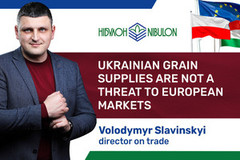Ukrainian grain supplies are not a threat to European markets - NIBULON

The most discussed news from the agricultural sector in recent days is the restriction which is introduced for the supply of grain, oil crops, and processed products by some of our neighbors - EU member states. We consider it appropriate to comment on the situation and highlight certain points.
Firstly, it is important to understand the primary problem, the attempts to solve which lead to the actions of the governments of neighboring countries that we see today. This problem is the dissatisfaction of local farmers and agricultural producers in Poland, Hungary, Romania and Slovakia with the current level of prices for grain and oil crops on the local markets. European farmers have concluded that the main reason for this is significant volumes of Ukrainian grain and processed products. And the governments of the related countries, attempting to prevent internal political instability, decided to support local agricultural producers and limit access of Ukrainian products to local markets.
Can we agree with the validity of such conclusions and actions? No, we cannot. The fact is that the prices on the local markets of the EU countries, as well as Ukraine, are, first of all, derived from the prices on the global markets of the related goods. Deliveries of Ukrainian grain to Poland, Hungary or any other country are not decisive, because they take place within the within the framework of market relations between private companies (exporters and importers) and are not intentional, that is, they are not the result of interstate agreements, centralized purchases or sales or same concerted actions of a group of private companies. This is confirmed by at least the fact that during the period when the prices on the global markets of the main crops and processed products were significantly higher, for example, from March 2022 to December 2022, and deliveries by rail and road transport towards the western border were significantly larger in volume, such a problem did not exist.
For example, let's look at the export of wheat and corn to Poland and Hungary in the three months before the New Year and in the three months after.
We can see that the volume of deliveries for the two main crops decreased by 28% for Poland and 23% for Hungary. So, it is obvious that supplies of Ukrainian grain were not the key factor that led to a decrease in prices on the domestic markets of these countries in recent months.
Also we would like to comment separately on objections regarding possible dumping by Ukrainian exporters, which, apparently, leads to the deterioration of relations with geopolitical partners. Such statements do not stand up to any criticism. It is obvious that in the present circumstances, when Ukrainian agricultural producers and traders are in a difficult economic situation due to the rising costs of growing grain and oil crops and the increase of logistics costs, in an entrepreneur's mind the last thing that can save is to engage in dumping and deliberately lower sales prices. In reality, every company of the national agricultural sector today is focused more than ever on finding opportunities to maximize its income and, due to skillful management and non-standard approaches, to reduce costs connected with growing and selling products. This is an axiom that is the key to the survival of a business operating under martial law.
Nevertheless, as of today, we have actually already adopted decisions by the governments of Poland and Hungary regarding the ban on the import of grain and oil crops and their processing products from Ukraine. Only border crossing in transit to third countries is allowed.
What will be the consequences of such actions? The direct consequences, firstly, will be the additional costs of those Ukrainian exporters who are currently fulfilling previously concluded contracts with deliveries to Poland and Hungary. Such companies will be forced to redirect already loaded wagons and trucks to other countries or to Ukrainian ports. In both cases, this will mean an urgent search for a new buyer and, accordingly, the need to reduce the price to interest a potential counterparty, as well as significant logistical costs connected with transport delay and changing the tracking route. Secondly, most likely, such actions of the governments of Poland and Hungary will not help them solve the main task and support prices on the local market, because the main consumers of grain and oilseeds, namely processing companies, have sufficient balances and are provided with raw materials for the near future.
At the same time, harvesting of the early group crops will begin in two months, which means a significant increase in supply from the same farmers and seasonal pressure on prices. On the other hand, even if we imagine that the ban on the import of Ukrainian agricultural products will contribute to the increase in the prices of raw materials within the EU, then instead of one problem, governments will have to solve another and deal with dissatisfied processors and the increase in food prices for people.
In summary, we can say that we are dealing with emotional decisions of government officials who do not solve systemic problems, create obstacles to the free functioning of the market, which is provided, among other things, by the agreement on the association of Ukraine and the EU, and cause business losses on both sides of the border. There is every reason to expect that such decisions will turn out to be temporary and in the near future we will see a change in rhetoric and sign of a more prudent approach on the part of the governments of our western neighbors.
IC UAC according to the NIBULON's Press Office
- 604 reads







